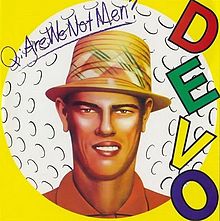(Planet of Sound is a bi-weekly speculative fiction music feature.)
In recognition of the Upper Atmosphere Research Satellite, which fell to Earth this past weekend, here’s Devo, one of the world’s great art-rock bands, weighing in on such phenomena with “Space Junk”—a jittery new-wave lament/ode to the truism of what-goes-up-must-come-down.
“Space Junk” appeared on Devo’s 1978 debut album, Q: Are We Not Men? A: We are Devo!, which released a bit less than one year before Skylab came crashing to ground amidst a frenzy of media hype in July 1979. Considering the dates, I don’t believe Devo would have had Skylab itself in mind when writing the song, but the timing seems fortuitous nonetheless. The song begins:
“Well she was walking all alone,
Down the street, in the alley.
Her name was Sally.
I never touched her.
She never saw it ”
Because they are Devo, for whom distancing, mechanization, and impersonality are all the personality they need, it is one of the least emotional reports of the death of an object of desire in the annals of popular music. We get one line mentioning how the narrator “never touched her,” and then a rather more loving description of the impact.
“She was hit by space junk. She was smashed by space junk. She was killed by space junk.”
From there, they go on into a second verse listing all the other places space junk fell, the necessary implication being that those other crash sites are of equal interest as the first. It’s in that list that we get the first hint of emotion—scorn—from lead singer Mark Mothersbaugh, with the exaggerated, sarcastic twang he gives to “Tex-ass” and “Kans-ass.”
Devo’s robotic, clone-like aesthetic led some commentators, like Rolling Stone, to call them “fascists” in early reviews, but as Steve Huey and Greg Prato put it at allmusic.com, “Devo dramatized conformity, emotional repression, and dehumanization in order to attack them, not to pay tribute to them.” The American Midwest and South were presumably breeding grounds, in Devo’s view, of the rigid, repressive, dysfunctional society they despised and hoped to undermine.
Incidentally, the song isn’t quite ripped from the headlines—only one person in history is thought to have been hit by space debris: Lottie Williams, who felt like she was “tapped on the shoulder” when struck in 1997 by what was later determined to be a small part of the fuel tank of a Delta II rocket.
So while the imagined Sputnikcide is the part that makes it science fiction, it’s the creepy, deliberate unfeeling—the affectless cataloging of the consequences of the mess we humans scatter across our planet and elsewhere—that makes it dystopian. Only Devo could tell this story quite this way and as far as they were concerned, they were writing about their present. I bet they’d stand by the satire of their sociopathic little fable today, too.
Joshua Starr is a fan of speculative fiction in all media. ALL MEDIA.










